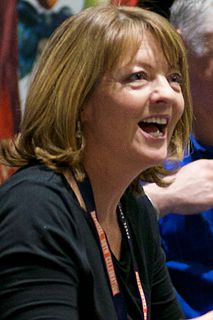A Quote by Cynthia Ozick
My first encounter with James was when I was seventeen. My brother brought home from the public library a science fiction anthology, which included 'The Beast in the Jungle.' It swept me away. I had a strange, somewhat uncanny feeling that it was the story of my life.
Related Quotes
I often use detective elements in my books. I love detective novels. But I also think science fiction and detective stories are very close and friendly genres, which shows in the books by Isaac Asimov, John Brunner, and Glen Cook. However, whilst even a tiny drop of science fiction may harm a detective story, a little detective element benefits science fiction. Such a strange puzzle.
It had also been my belief since I started writing fiction that science fiction is never really about the future. When science fiction is old, you can only read it as being pretty much about the moment in which it was written. But it seemed to me that the toolkit that science fiction had given me when I started working had become the toolkit of a kind of literary naturalism that could be applied to an inherently incredible present.
Way back in 1989, I got lucky with my first published story when it was selected for the Journey Prize anthology. Then I got lucky three more times. It is astounding to see how many writers published in the anthology have gone on to publish great story collections and novels. The anthology is a windfall for both writer and reader.
There are many other writers whose work I admire tremendously, but none whose work struck me at just the right young age. Jack Vance taught me that speculative fiction, science fiction, could be wonderfully and liberatingly stylistic. It didn't have to be pulp stuff. He really changed my writing and my view of science fiction, so if nothing else, my little homage to him in the novelette I wrote for that anthology is my thank-you to him. He helped me see that any genre can have excellent writing in it.
I once fell 20 feet from a tree, was knocked unconscious, and when I picked myself up and straggled home, my parents thought I was making it up. However, when my brother and I fabricated a story about an encounter with a bear, they believed that! So maybe I learned very early on that fiction was more interesting to listeners!
Science fiction is a weird category, because it's the only area of fiction I can think of where the story is not of primary importance. Science fiction tends to be more about the science, or the invention of the fantasy world, or the political allegory. When I left science fiction, I said "They're more interested in planets, and I'm interested in people."
I define science fiction as the art of the possible. Fantasy is the art of the impossible. Science fiction, again, is the history of ideas, and they're always ideas that work themselves out and become real and happen in the world. And fantasy comes along and says, 'We're going to break all the laws of physics.' ... Most people don't realize it, but the series of films which have made more money than any other series of films in the history of the universe is the James Bond series. They're all science fiction, too - romantic, adventurous, frivolous, fantastic science fiction!
My first encounter with science fiction was reading the work of H.G. Wells when I was nine or ten, and I don't believe 'The War of the Worlds' or 'The Time Machine' have ever been bettered. Plus, I have always had a liking for Victorian and Edwardian clothes and contraptions, which tends to color the worlds I dream up.





































